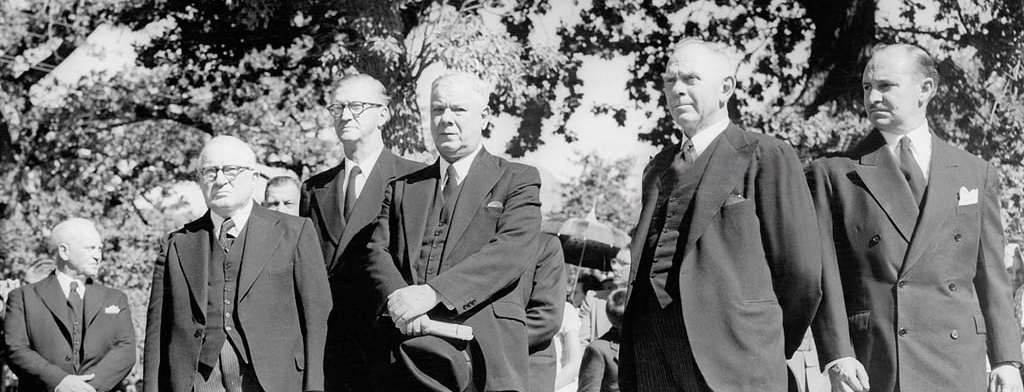SELECTIVITY: The National Party perfected Afrikaner empowerment long before BEE entered the national lexicon – yet right-wing groups like Solidariteit howl against transformation as if history began in 1994, writes former editor Themba Khumalo…
By Themba Khumalo
There is a peculiar kind of historical amnesia gripping certain corners of the Afrikaner establishment — a selective blindness that allows them to see and bemoan Black Economic Empowerment (BEE) as “reverse racism” while lounging in the lingering fruits of their own, state-engineered economic miracle.
The irony is so pungent one could bottle it and sell it as vintage hypocrisy.
When Afrikaner nationalism was incubating under the banner of “volk and faith,” the architects of apartheid were not only asking for a fair shot, they were engineering total control. From the Broederbond’s smoke-filled rooms to the boardrooms of the National Party, the mission was singular: to wrest control of South Africa’s economic levers from the British, while brutalising and excluding the Black majority.
It was not ideology; it was economics soaked in sanctimony. And many, many decades later, their descendants portray themselves as victims whenever transformation threatens their inherited comfort.
Truth be told, Afrikaner empowerment was the most successful state-sponsored project this continent has ever seen. From Eskom to Iscor, from Sasol to the Land Bank, every parastatal was built to serve the socio-economic upliftment of only Afrikaners.
Every bursary, every tender, every policy was written in the name of the volk. That wasn’t meritocracy; it was the architecture of privilege, carefully welded together with the taxpayers’ money of those it excluded.
Even the banks were conscripted into the Afrikaner bastion of power — fortresses of privilege where capital wore a white face and the vaults reeked of exclusion, their doors slammed so violently in the faces of black South Africans that the echoes still haunt the corridors of finance.
Yet, today, the same beneficiaries of that system, now trading under names like Solidariteit, cry foul at BEE — a belated, imperfect, but necessary attempt to rebalance an economy built on stolen sweat and state-sponsored exclusion.
Solidariteit presents itself as a trade union, fighting for workers’ rights — but its campaigns tell a different story. Scratch the surface, and its cultural and rhetorical DNA remains deeply aligned with its bigoted heritage, with its message still echoing the familiar language of grievance, the weary refrain that transformation has gone “too far,” as though centuries of exclusion could be undone in a policy of few decades.
Solidariteit’s recent campaigns — those moral tantrums scribbled on banners and echoed across social media — are not about justice; they are about entitlement. They claim, absurdly, that South Africa is the “most race-regulated country in the world” — a caravan of unfiltered, sanctimonious drivel, paraded with all the gravitas of a charlatan’s sermon. These agitators are not crusaders for equality; they are anti-transformation zealots, terrified of losing the head start history handed them.
For decades, the state carried Afrikaners from the gutter to the summit, using policies that would make even the most ardent BEE critic blush. Job reservations, preferential loans, land giveaways, and subsidised education were the scaffolding of a privileged economy built at the expense of the black majority.
Now, the inheritors of these very privileges brandish victimhood like a talisman against accountability.
Even within the framework of BEE — which is by no means perfect — corruption has not been a one-sided affair. Some Afrikaner capitalists have cynically manipulated the system, using black people as fronts to secure tenders and contracts. They enriched themselves while those they paraded as “partners” were left with crumbs or, in many cases, nothing at all. These are not outliers; they are the modern face of the same old greed wearing a reformist mask.
Imperfect as it may be, BEE remains a moral and historical necessity — a policy that can, and must be made to work. Because if the black majority continues to be economically sidelined while a tiny elite, black or white, gorges on opportunity, the cost will not be paid in statistics or parliamentary debates. It will be paid in unrest, in disillusionment, and in the destruction of the dream of national unity.
So, the next time Solidariteit or its lickspittles cry foul at BEE, they should remember their own history — the state-backed empire that raised them from rags to riches, from volk to vanguard.
And perhaps, just perhaps, they might realise that what they call “reverse racism” is, in truth, a modest attempt at moral arithmetic — the balancing of a scale that was broken long before any black child was born into democracy.
If Solidariteit and its band of anti-transformation bigots persist in mocking redress and clinging to their inherited privileges, let them understand this: their rhetoric is an outrageous insult to a restless majority whose patience has been braided with grief and endurance — and when that long-suppressed fury finally breaks, it will not be papered over with platitudes, negotiated in cosy boardrooms, or pardoned by history; it will descend as a reckoning — civic, economic, and moral. It will expose, unmask and damn those who once fancied themselves forever blessed.
* The writer, Themba Khumalo, is an independent publisher, journalist and former editor































